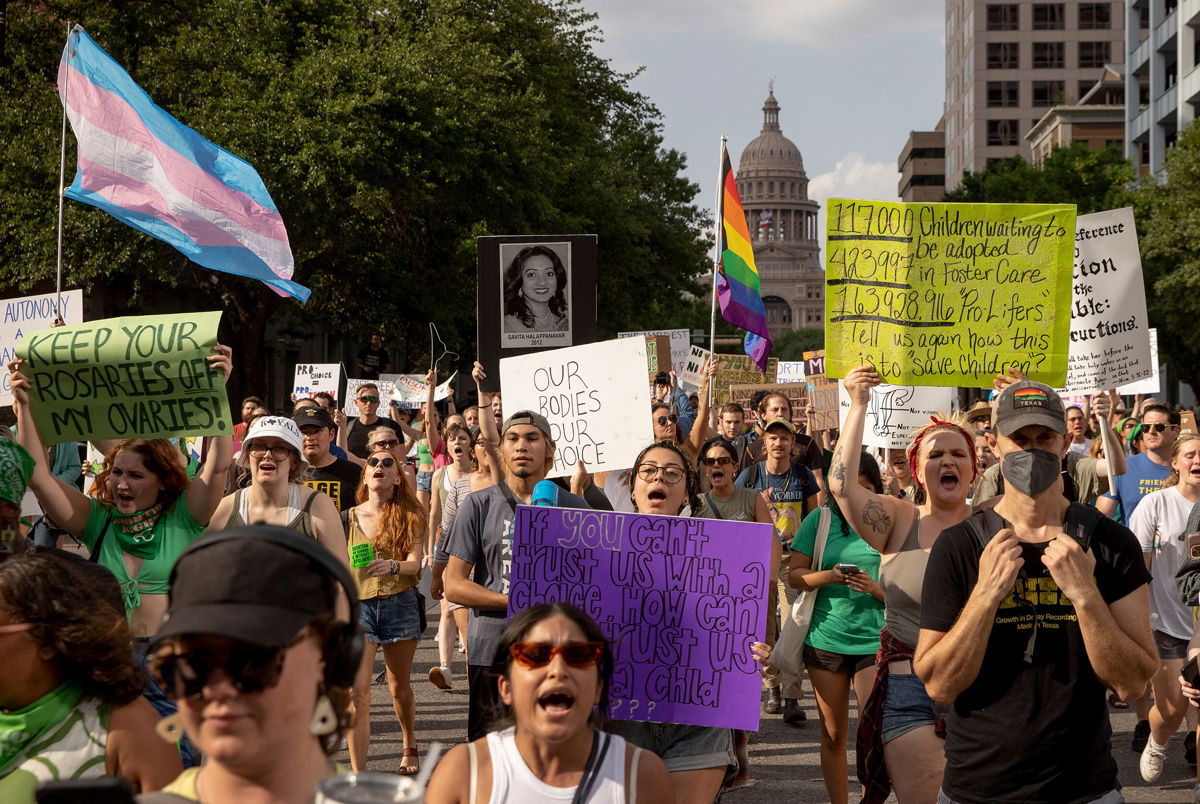Americans’ views on abortion diverge along more than just partisan lines

Protesters march from the Capitol to the United States Federal Courthouse to rally for abortion rights in Austin
By Ariel Edwards-Levy, CNN
Americans’ views on abortion are sharply divided across partisan lines, CNN’s latest polling shows: An overwhelming 88% of Democrats want to see Roe vs. Wade upheld, while a smaller 63% majority of Republicans want to see it overturned. But neither party is entirely monolithic on the issue, with additional divides across generational and religious lines.
Age is a key factor, with younger Americans across party lines often expressing more liberal or stronger views on abortion than those held by older members of their party. Among Democrats and Democratic-leaning independents, a law establishing a nationwide right to abortion is popular with both those younger than 45 (81% of whom support it) and those 45 and older (84%). But 67% who are younger than 45 say they’d be angry if the Roe vs. Wade decision were overturned, compared with 54% of those 45 and older.
Democratic-affiliated voters younger than 45 are also more likely than their older counterparts to consider the issue a litmus test. Forty-one percent say they’d only vote for a candidate who shares their views on abortion, nearly twice as high as the 22% of older Democratic-affiliated voters who feel that way. That, however, doesn’t necessarily mean the issue will get them to the ballot box — those younger voters are only about half as likely as their older equivalents to say they’re extremely excited to vote in this year’s congressional elections, 13% vs. 26%.
There are similar age divides within the GOP. Republicans and Republican-leaning independents younger than 45 are split 50-50 on whether or not they’d like to see Roe overturned, and only 24% say they’d be happy — rather than merely satisfied, dissatisfied, or angry — with such a decision. By contrast, a solid 64% majority of those 45 and older are in favor of overturning Roe, with 38% saying they’d be happy to see it happen.
Younger Republicans and Republican-leaners are also more likely than their older counterparts to say they’d favor relatively permissive abortion laws in their state if Roe were overturned, 45% to 19%. And just above half (54%) say their views on abortion matches up most closely with those held by the Republican Party, with 22% saying they’re closer to the Democrats, and 24% that they’re not well-aligned with either party — significantly more of a partisan divergence than among older Republicans (73% of whom say their views align with the GOP on abortion), or among Democrats of either age group.
Within the GOP, there’s also a notable divide between those who identify as evangelical or born-again Christians, and those who do not. Among Republicans and Republican-leaning independents who identify as evangelical, 76% favor overturning Roe and 54% would be happy to see it overturned; among those who don’t, those numbers are 49% and 21% respectively. And 35% of GOP-affiliated voters who are evangelicals say they’d only vote for a candidate who shares their views on abortion, while just 19% of non-evangelical GOP voters say the same.
By contrast, there are fewer sharp gender divides on abortion within each party. Similarly broad shares of Democratic-affiliated men and women oppose overturning Roe (90% vs. 89%, respectively) and say they’d be angry to see it overturned (60% vs. 61%). Across the aisle, Republican-affiliated men and women share a preference for overturning Roe (60% vs. 58%, respectively), and an identical 73% of both groups hope to see their state move toward more restrictive abortion laws in the event that it’s struck down.
GOP women, however, are slightly more likely than GOP men to express strong emotions in both directions over the prospect of Roe being overturned — 37% of these women say they’d be happy and 16% that they’d be angry, compared with 30% and 9%, respectively, among their male counterparts.
The CNN Poll was conducted by SSRS on May 3-5 among a random national sample of 800 adults surveyed online or by phone after being recruited using probability-based methods. Results for the full sample have a margin of sampling error of plus or minus 4.5 percentage points. It is larger for subgroups.
The-CNN-Wire
™ & © 2022 Cable News Network, Inc., a WarnerMedia Company. All rights reserved.